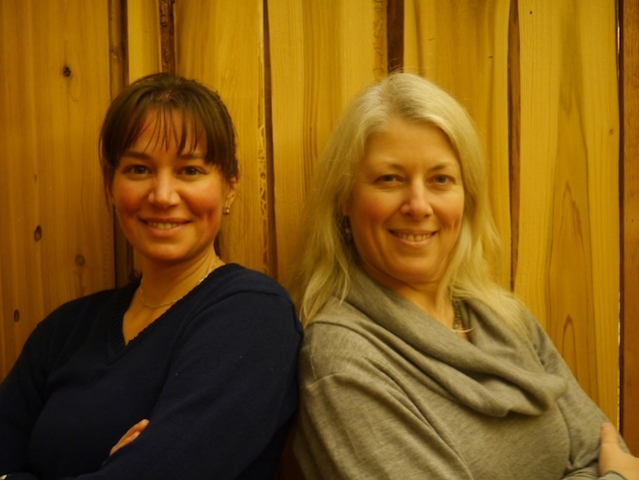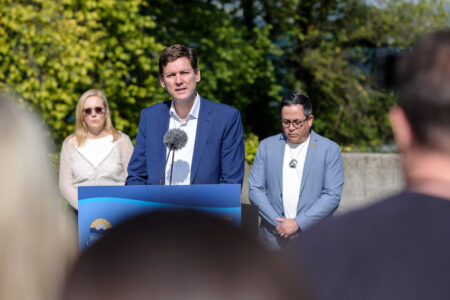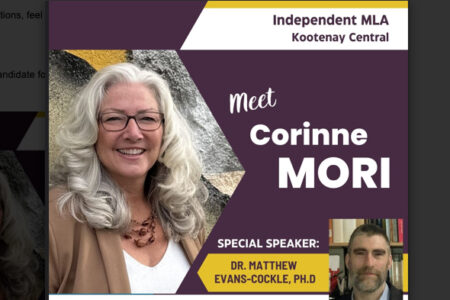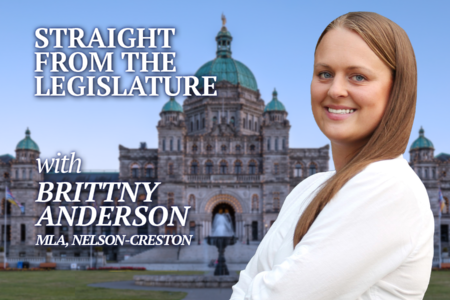Learning the Ropes: A Discussion with Councillors Kiss and Batycki About Their First Year on City Council (Part 1)
Paula Kiss and Candace Batycki were elected to Nelson City Council for the first time in the fall of 2011, joining a group of re-elected veterans. Both came to council with technical and environmental credentials. For many years, Councillor Batycki has been the Director of Forest Programs for the national organization ForestEthics. Councillor Kiss is a civil engineer who runs a green building business in Nelson. They are the youngest members of Council.
The Nelson Daily sat down with Councillors Batycki and Kiss recently to talk about what their first year has been like. This is the first half of the interview; the second part will appear in The Nelson Daily on December 14. This transcript of the interview has been lightly edited for brevity and clarity.
The Nelson Daily: What do you like best about being on City Council?
Candace Batycki: I like the variety. I like the incredible range of things you have to consider, and that you have to become conversant with, in order to make good decisions. And I like— I didn’t at first, because it intimidated me— but I have started to like the give and take of council debate, and seeing what can happen, how council can move from one place to another place in decision-making based on the rigour and courage of the debate, so I like that.
Paula Kiss: I like how much I have learned about this community. I have an appreciation for how many community involved groups are out there, seeing presentation after presentation about the fantastic things people are doing and what they are passionate about.
And I appreciate the city staff a lot more. I am sure that everyone that has walked into city hall and looked at the reams of people that are working there are thinking, wow, we could cut back by reducing staff. Now I have an appreciation for how hard those people work and what they do.
What drives me is learning a whole bunch of stuff and trying to be as effective as I can in my community. I like the things I am learning about how I can be a better citizen.
And one of the things I like is being on the same council as Candace.
Is there a gap between what it’s like to be on Council, and what you thought it would be like?
Paula Kiss: I spend a lot more time on the computer than I thought I would. And the meetings run on longer than I thought they would. I thought the pace of the agendas would go faster.
Candace Batycki: Yeah, the agendas that look like they are going to take forever go really quickly and the ones that look pretty straightforward can go on for hours and I have not figured out whether there is a science there or not.
I wanted to more proactive out of the gate, and everybody said, “Oh, it will take a whole year to figure out what is going on,” and I arrogantly thought, “Well, no.” But it was true. It does take a whole year.
I feel like I am reacting to things more than I had thought. But there is an awful lot to react to, and a lot of the things that come forward to respond to are really interesting, so for me there is a difference between my activist life where you are making things happen all the time (as opposed to being in a decision-making role.)
Paula Kiss: I thought it would take me about a year. I have often made the mistake in different jobs where I try to do too much too soon and it ends up burning bridges for me, so I kind of thought it would take a year for me to figure out how everyone works together before I could do anything. But now I am starting to see how people work together, and I see it is even more complex than I thought it was. Now I am worried that it is going to take me more than year before I can actually initiate some things, and that kind of freaks me out because it is only a 3-year term and I had hoped to accomplish a lot.
Candace Batycki: You see the long term things like the Cultural Development Commission, the evolution of a body like that, from some shared ideas to something that has now got a membership and a paid coordinator and it has some operating money. That is a multiple year thing to make happen, so I have some appreciation for how long things can take.
It is like any system. How to work the system, make the system work for you, and how to work effectively for the system because it is a big system. And we are in service to that, so it works both ways.
How do your activist leanings fit with the idea of trying to fit within a system?
Candace Batycki: I have found it interesting to go from lobbying government to being government. I am constantly being reminded of this when I am sitting around a table and talking about government and then they look at me and say, “You’re government.” And I think, “Oh yeah, right.”
It’s different. One of the things I have really enjoyed is working with younger people and saying, “Here is how it works, from both sides of the desk.” That has been great. For me it is figuring out how it works from the other side of the desk. For example if I have something I am interested in seeing happen, I might go to a bunch of people who are also interested in seeing that happen and say to them, “Make some noise.”
Paula Kiss: Which brings me back to the observation that we are quite reactive. We will deal with something when the public brings it to the forefront, or we will deal with something when it absolutely becomes critical.
It seems like Council is dealing with a lot of things that should have been dealt with years go. I get the impression we are catching up on a real big backlog of updating bylaws and that kind of administrative governmental stuff. So how do you make something a priority? You force Council to react to it by getting people to stand up and make it an issue. So in a way it is sad, but it seems to be the place we are in right now, is that we are reacting to things.
Candace Batycki: It is also money. Things don’t happen until there is money for them. And getting a sense of how the budgets work and how funding works and where the funding pots are and how they are being accessed. It appears to me that staff is very good at accessing those pots of grant money.
For example, sitting on the Downtown Waterfront working group, you sit around the table and here are all the different projects that could happen to make this a reality. Here are the ones that already have some funding, and they are moving ahead and there are others that are not going to happen until some money shakes loose. There is no extra money in the city budget. Certainly last year as a rookie I had no idea how to move any money around at all.
If you look at people who are good at working with this particular system they know how to shake loose pots of grant money, they know the doors to open.
You mentioned that there were things you thought you would be able to bring forward if you could be more proactive. What would you bring forward?
Candace Batycki: Food. We have so much going on in terms of food here, we have community gardens—which is great, I am not trying to control the food conversation, but I look at the housing conversation or the cultural conversation and I think there is some benefit there from having some policy in place. We saw that the regional agricultural plan recommended an urban food strategy for Nelson and we don’t have one.
There are all these great things happening, everyone wants to build greenhouses, and I can’t help but think that some city policy or coordination would help us at the figure out what our role is. Now, it is very ad hoc. And there are a lot of cool things we could be doing on our underutilized lands but there is no policy to guide us and we need that. Invasives, that is my other one, we need an invasive plant strategy because there are things we could be doing there.
Paula Kiss: Adjusting building bylaws and utility rates to make it easier for people to build modest housing. I don’t think we have enough of a variety of housing. We have a variety of people looking for different kinds of housing, but our housing tends to be homogenous. That is a problem and it is based on a lot of our rate structures and land values.
So that is one part of a healthy community and another which is a really big one for me, and I get mocked about this all the time, is a more walkable community, not just healthy in terms of physical but economic and social health mental health. We are not doing enough to make this town more walker friendly, or cyclist or skateboarder or whatever.
I get poked fun at for talking about covered sidewalks or stairways and I think that is a big part of it. There are a lot of people who are two or three season walkers because it is not safe to walk up and down our hills and stairs and there are things we could do that would have a long lasting impact and would address the parking crunch downtown and would address how many trips people make to the hospital because they are getting their daily exercise.
Would you restrict cars downtown?
Paula Kiss: I would rather offer incentives to get people not to take their cars downtown, to make it so much of a more pleasant experience to take the bus or walk or bike downtown, so that you would voluntarily decide not to bring you car downtown. So let’s re-write the dialogue.
Candace Batycki: I just did some research on this and it is almost impossible to make car travel suck. The only thing you can do is make parking suck and make the experience of being in traffic suck, but car travel rocks. Having your own car rules. What does work is making all the other alternatives so much more attractive.
Paula Kiss: Many people don’t choose to walk became they can’t do it without sucking people’s exhaust. For some people it might be a laziness and for other it maybe a physical health issue but we have to recognize that if people were driving and their exhaust was piped into the cab of their vehicle they would not think it was that pleasant. Walking would be a lot more fun if the street was not full of cars.
Part two of this interview will be published in The Nelson Daily on Friday, December 14. Councillors Batycki and Kiss will tell us:
- how their environmental interests fit into their civic role,
- their most difficult council decision so far,
- what they think the public needs to understand about city council,
- the groups of people in Nelson that Council traditionally does not seem to understand or notice, and
- the social life of a politician.

























